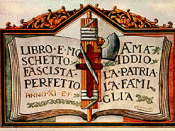Fundamentally the rulers of Italy did very little to advance the cause of national unity in the years between 1820 and 1944, as it better served their interests not to. Although Italy after 1871 was seen as a single state as it "existed at last, as a set of unified institutions" I would argue that fundamental unity did not occur. This unity was merely nominal - the reality being that a great amount of apathy existed towards national unity and among the Italian population and continued to exist throughout the period. Significant recurring themes are evident throughout the period, which support this argument, for example regionalism, anti-clericalism and the divorce of 'real' and 'legal' Italy.
The desire for an Italian national identity can be traced back as far as the seventeenth and eighteenth centuries. Both Machiavelli and Dante envisaged 'Italia' as a cultural nationalist expression. S. Battilini and Carlo Denina also wrote in terms of an Italian identity. During the period 1820-1944 Italy experienced three ruling eras. Firstly rule under external European powers, Austria and other regional monarchs. Secondly the liberal establishment and the constitutional monarch King Victor Emmanuel and thirdly Mussolini and his fascist regime succeeded the liberal state in the inter world-war period. Italian politics during this period were characterised by the continuity of the status quo.
I will consider certain criteria to determine whether national unity increased and then consider who were the promoters and detractors. For example the extent of 'regionalism,' both economically (i.e. financial equality) and socially can be used to measure national unity. Moreover if the population identified with a set of 'Italian' cultural norms, as opposed to a regional identity, if there is a reduction in antagonism between clericalism and laicism and likewise between 'real' and 'legal' Italy then one could say...


